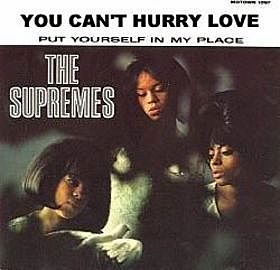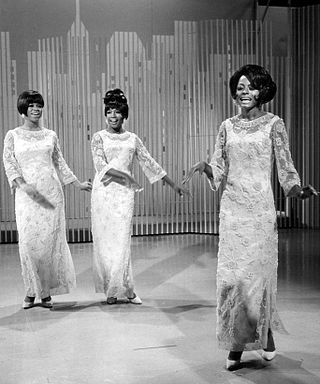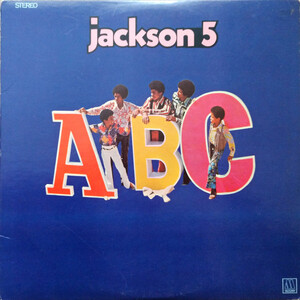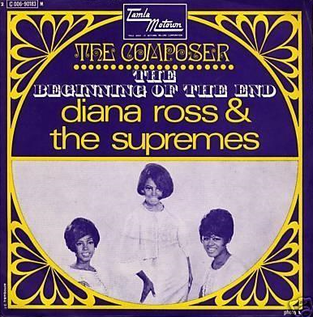Related Research Articles
"Someday We'll Be Together" is a song written by Johnny Bristol, Jackey Beavers, and Harvey Fuqua. It was the last of twelve American number-one pop singles for Diana Ross & the Supremes on the Motown label. Although it was released as the final Supremes song featuring Diana Ross, who left the group for a solo career in January 1970, it was recorded as Ross' first solo single and Supremes members Mary Wilson and Cindy Birdsong do not sing on the recording. Both appear on the B-side, "He's My Sunny Boy".

"Stop! In the Name of Love" is a 1965 song recorded by the Supremes for the Motown label.

"Reflections" is a 1967 song recorded by American soul music group The Supremes for the Motown label. The single release was the first Supremes record credited to "Diana Ross and the Supremes", and the song was one of the last Motown hits to be written and produced by Holland–Dozier–Holland before they left the label.

"Come See About Me" is a 1964 song recorded by the Supremes for the Motown label. The track opens with a fade-in, marking one of the first times the technique had been used on a studio recording.

"Back in My Arms Again" is a 1965 song recorded by The Supremes for the Motown label.

"Love Child" is a 1968 song released by the Motown label for Diana Ross & the Supremes. The second single and title track from their album Love Child, it became the Supremes' 11th number-one single in the United States, where it sold 500,000 copies in its first week and 2 million copies by year's end.

"You Can't Hurry Love" is a 1966 song originally recorded by the Supremes on the Motown label. It was released on July 25, 1966 as the second single from their studio album The Supremes A' Go-Go (1966).

American girl group The Supremes has released 29 studio albums, four live albums, two soundtrack albums, 32 compilation albums, four box sets, 66 singles and three promotional singles. The Supremes are the most successful American group of all time, and the 26th greatest artist of all time on the US Billboard charts; with 12 number-one songs on the Billboard Hot 100 and three number-one albums on the Billboard 200. The Supremes were the first artist to accumulate five consecutive number-one singles on the US Hot 100 and the first female group to top the Billboard 200 albums chart with The Supremes A' Go-Go (1966). In 2017, Billboard ranked The Supremes as the number-one girl group of all time, publishing, 'although there have been many girl group smashes in the decades since the Supremes ruled the Billboard charts, no collective has yet to challenge their, for lack of a better word, supremacy.' In 2019, the UK Official Charts Company placed 7 Supremes songs—"You Can't Hurry Love" (16), "Baby Love" (23), "Stop! In the Name of Love" (56), "Where Did Our Love Go?" (59), "You Keep Me Hangin' On" (78), "Come See About Me" (94) and "Stoned Love" (99)—on The Official Top 100 Motown songs of the Millennium chart, which ranks Motown releases by their all-time UK downloads and streams.

ABC is the second studio album by the Jackson 5, released on May 8, 1970 by Motown. It featured the No. 1 singles "ABC" and "The Love You Save", and has sold up to 6 million copies worldwide. Also present on the LP are several notable album tracks, including a cover of Funkadelic's "I'll Bet You", "I Found That Girl", and "The Young Folks", originally recorded by Diana Ross and the Supremes.

"I'm Gonna Make You Love Me" is a soul song most popularly released as a joint single performed by Diana Ross & the Supremes and the Temptations for the Motown label. This version peaked for two weeks at No. 2 on the Hot 100 in the United States, selling 900,000 copies in its first two weeks, and at No. 3 on the UK Singles Chart in January 1969.

"Up the Ladder to the Roof" is a 1970 hit single recorded first by The Supremes for the Motown label. It was the first Supremes single to feature new lead singer Jean Terrell in place of Diana Ross, who officially left the group for a solo career two weeks before the recording of this song in January 1970. This song also marks a number of other firsts: it is the first Supremes single since "The Happening" in 1967 to be released under the name "The Supremes" instead of "Diana Ross & The Supremes", the first Supremes single solely produced by Norman Whitfield associate Frank Wilson, and the first Supremes single to make the United Kingdom Top 10 since "Reflections" in 1967.

"I'm Livin' in Shame" is a 1969 song released for Diana Ross & the Supremes on the Motown label. The sequel to the Supremes' number-one hit, "Love Child," the song peaked in the top ten on the US Billboard Hot 100 pop chart at #10 and the top 20 in the UK at #14 in April and May 1969.

Love Child is the fifteenth studio album released by Diana Ross & the Supremes for the Motown label in 1968. The LP was the group's first studio LP not to include any songs written or produced by any member of the Holland–Dozier–Holland production team, who had previously overseen most of the Supremes' releases.

"Love Is Here and Now You're Gone" is a 1967 song recorded by the Supremes for the Motown label.

Cream of the Crop is the eighteenth studio album released by Diana Ross & the Supremes for the Motown label. It was the final regular Supremes studio album to feature lead singer Diana Ross. The album was released in November 1969, after the release and rising success of the hit single "Someday We'll Be Together."

"The Composer" is a 1969 song released for Diana Ross & the Supremes by the Motown label.

"I'll Try Something New" is a song written by Smokey Robinson and originally released in 1962 by The Miracles on Motown Records' Tamla subsidiary label. Their version was a Billboard Top 40 hit, peaking at #39, and just missed the Top 10 of its R&B chart, peaking at #11. The song was released later as a joint single by Diana Ross & the Supremes and The Temptations, also becoming a charting version on the Billboard 100 pop singles chart, peaking for two weeks in April 1969 at number 25.

"Touch" is a soft ballad written by Pamela Sawyer and Frank Wilson, who also produced it as a single for Motown recording group The Supremes, who issued it as a single in 1971.

"No Matter What Sign You Are" is a song released for Diana Ross & the Supremes by the Motown label.

"Where Did Our Love Go" is a 1964 song recorded by American music group the Supremes for the Motown label.
References
- ↑ "The Young Folks - Diana Ross & the Supremes". Allmusic . Retrieved 4 February 2021.
- ↑ "SOUL BROTHERS TOP 20". Jet . Vol. 37, no. 3. Johnson Publishing Company. 23 October 1969. p. 65. ISSN 0021-5996 . Retrieved 4 February 2021.
- ↑ Planer, Lindsay. "ABC - The Jackson 5". Allmusic . Retrieved 4 February 2021.
- ↑ Dahl, Bill (28 February 2011). Motown: The Golden Years: More Than 100 Rare Photographs. Penguin Publishing Group. ISBN 9781440225574 . Retrieved 4 February 2021.
- ↑ "Top RPM Singles: Issue 6043." RPM . Library and Archives Canada.
- ↑ "The Supremes Chart History (Hot 100)". Billboard.
- ↑ "CASH BOX Top 100 Singles". Cashbox . August 9, 1969. Archived from the original on 3 December 2019. Retrieved 31 December 2020.